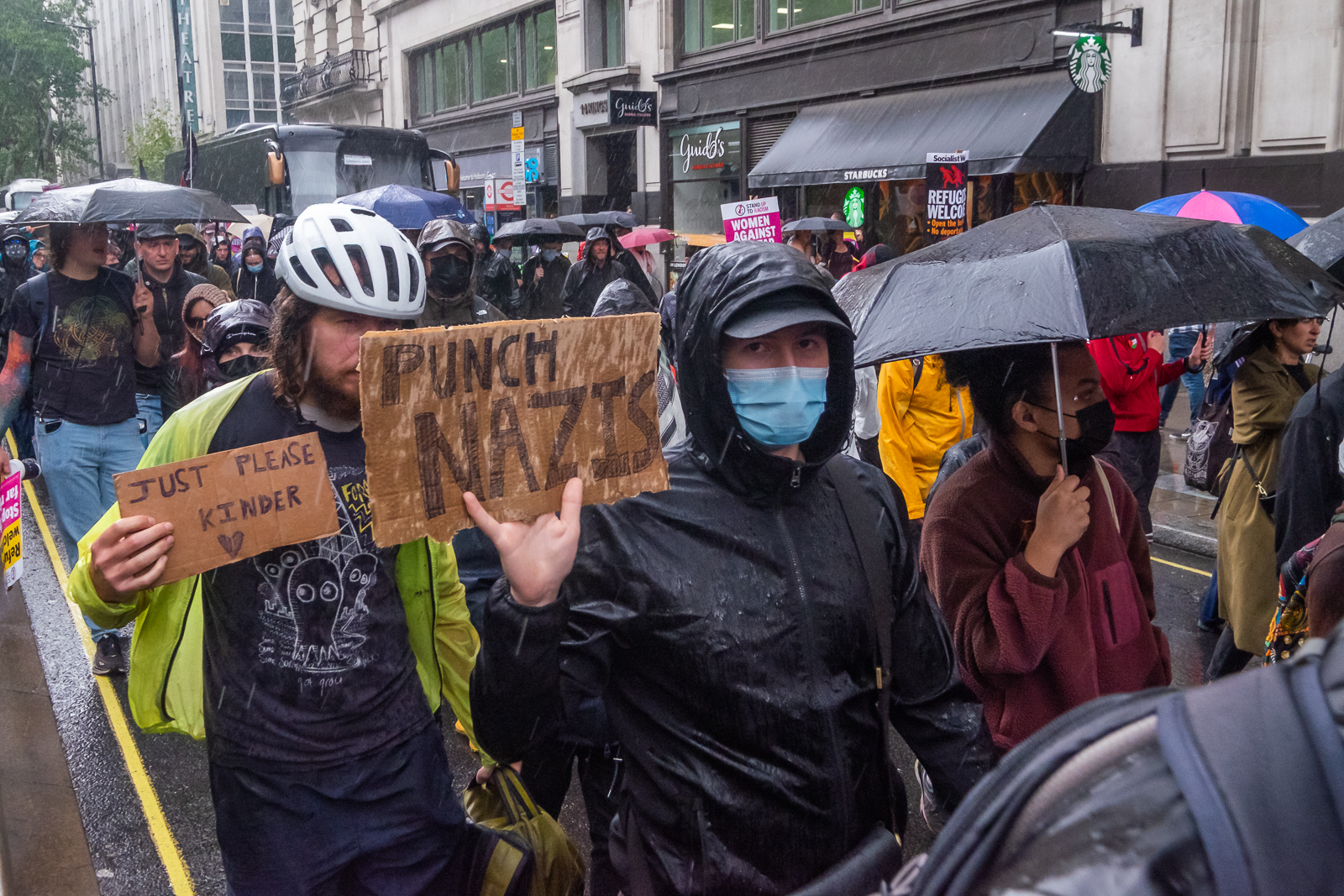We need to know how to bring people in, but also how to allow them to step away —
When I left university and joined my first horizontal group, my thoughts remained with the book-learning I had undergone for three years. I wasn’t totally naïve. I didn’t think we’d spend all our time in highfalutin conversation, or that it would be constructive if we did. We all fell for the image of anarchists making bold statements and engaging in acts of heroic rebellion. But the actual practice of anarchism is mostly mundane, especially if you’re doing it well, a set of day-to-day skills that are rarely discussed. The question of how to maintain good group dynamics, finances, and non-violent conflict resolution, amongst others, never receive as much attention. I learnt to ask them after seeing the disasters that occur when they are neglected.
Today, with the goal of diverting money and legitimacy from Israel, a new generation of students are implementing horizontal strategies in their occupation encampments. My own minor role revealed to me that the youngsters are replicating the failures of ignoring these day-to-day acts of maintenance. That is not to snipe at them: they have done remarkable jobs, superior to what I would have done at their age. In fact, I feel quite inspired by what I saw. But their beginner mistakes make me confront this weakness in anarchist – or more broadly direct action – culture, which is that we haven’t circulated our practical experience and advice more widely.
Political disagreement is inevitable. Within my local student encampment, opinions ranged from anarchists to Stalinists and those with no theory. Our labels didn’t have to matter at all. But a handful saw things differently. I recall my befuddlement when, after a seemingly healthy and open meeting, I got chatting to a group who immediately began jeering about the “revisionists” and “Trotskyites “(and after I left, “anarchists”) amongst us. At another time, an able organiser who advocated a cautious approach was slandered as only having those views due to his “posh” upbringing and wanting to protect his academic position. Most of these people quit the camp. Likewise, within anarchist spaces I have seen multiple people leave after disagreements, and be slagged as ‘not a real anarchist’ behind their back.
Conflict is simply a gap between reality and desire: I want this thing, I do not have it, so I will change myself or my environment to get it. But taking advantage of conflict requires us to be comfortable with it, which is not a state of mind we are brought up in. Conflict often means claiming that a person who disagrees with me has ulterior motives, or is crazy, evil, or stupid. It is hard but so much more necessary to empathise with, and honestly criticise, another’s views; and harder still to acknowledge fault in our own. Benjamin Tucker once said that the victor of a debate is the one who learnt the most.
If our goal is to form a group that is free and equal, we need to think beyond having open meetings. This quality also comes from sharing out tasks and involving everyone as equally in the culture of the group as you can. For the most part, people join activist groups because they want to give something of themselves to the struggle, and speaking at meetings or volunteering for tasks is one way of doing that. It is perhaps inevitable that some will take on more than others due to their skills, confidence, and availability. Some people just have forceful personalities. When they become relied upon, usually it happens with the passive consent of the rest of the group – in the short term, it makes them comfortable not to worry about the details or the enactment process. But doing everything by yourself creates burnout and frankly isn’t any fun, so those individuals they rely on are bound to fall away at some point without anyone to replace them.
To counter this, we should make an active effort to bring the ones outside in and allow the ones inside to step away when necessary. We must consciously encourage new perspectives to be heard, new talent to be fostered. If someone isn’t speaking up at meetings or taking on tasks, they should be invited to by the more experienced members and mentored. One idea is ‘step forward, step back’, when collective members are asked to consider whether they have spoken more or less than their fair share. If more, you should allow others space, and if less you should express your opinions. A similar exercise is a go-around, when each member is asked to give their view on the topic at hand. It may also be good to ask whether the meeting as a whole is going well from an emotional standpoint, which is especially useful during more contentious discussions. Another idea is to assign a ‘vibes watcher’ who will keep track of how (dis)interested and agitated members are becoming, and who may interject with a request for breaks or the above processes if the facilitator does not. On this topic I would highly recommend the short books Consensus by Peter Gelderloos and Come Hell or High Water by Delfina Vannucci and Richard Singer.
Change is a slow, cooperative, and meticulous process. Everything about left-wing rhetoric marshals against a cautious approach. We spend so much time absorbed in the moral drama of politics and criticising technical solutions to problems. We are taught that human relations are governed by conflict, which is only overcome by the dramatic, forceful victory of the underdog. In the end, a persuading, thoughtful, and mutually beneficial process seems alien to us. But whenever I’ve rushed into making a decision or taking action, I’ve almost always regretted it later.
It is simply true that careful planning and research mitigates basic errors in action. We don’t realise how much our conceptions are warped by myths and propaganda, particularly the left-wing ones it feels good to believe in. Particularly on anti-fascist actions, I and my pals have felt obligated to ‘do something’, only for things to go south and we realised what absolute amateurs we were. There isn’t any shame in ducking an action or topic until you’re equipped to deal with it effectively. If you end up injured (physically or mentally) or in jail you’re no help to the struggle. Don’t be a casualty!
More positively, in the most effective groups I’ve been in the members work towards a common goal autonomously and enthusiastically. Many projects need multiple roles like finance, media, etc. and therefore the cooperation of several individuals. When one or two of those drag their feet, not out of malice but a lack of understanding or enthusiasm, it makes that project fall behind. This means making the effort to invite in criticism and concerns to satisfy all.
Now, some words about speaking freely. Criticising your friends is difficult at the best of times. Nevertheless, scrutiny and debate is an invaluable tool for improving our actions. I recall being involved in an action which I felt was all risk and little reward, but raised my concerns only privately to the primary organiser. A year later and during a routine conversation everyone else involved admitted they thought the same. Far too late to have avoided potential danger! Why didn’t we say something? We simply hadn’t built an atmosphere of free and rigorous discussion, which libertarians should endorse at every turn.
I belabour this point because I have noticed that faculty occupations within universities have, amongst some, gotten a reputation as a ‘real’ and ‘serious’ form of protest. For me, this is a classic mistake of spontaneous and libertarian organising: to put all your effort into one big blow which inevitably has no follow-through. The university can just wait for the sleepless, hungry, and unshowered students to go home after a week or two. Occupations are the apex of all the tempting but counterproductive tendencies I’ve discussed. They are explosive, dramatic, and self-sacrificing. They treat the university as an antagonist that must be conquered. History will tell what the most effective tactic is, I suppose. But my advice based on my experiences is that the slow labour of organising is to make an impression on the student body, win the moral argument, become a genuine majority force, and treat the administration as a negotiating partner rather than purely as an antagonist. It is not that we ‘play nice’ but rather that we rely on persuasive and moral force first and physical force – like occupation – as an accessory to that. The universities will remain long after the encampments are gone. If we conquered them and made them submit to our demands against their will, they will naturally go back on on their agreements at first opportunity. The administrations claim to be responsible to the students, and probably they genuinely want to be. So let’s make the popularity of our demands so obvious that they feel honour-bound to fulfil them regardless of whether we hold a sword above their heads or not.
My advice regarding being in a direct action group can be boiled down to this: these groups exist not just to solve a specific issue but as a model of the society that is to be. We need to treat them that way. Do we want to live in a society where bluster and slander are superior to debate and understanding? Where minorities are depended upon by majorities? Where people rush into bad decisions and take others with them? These are the most common mistakes that I’ve seen (and made!) since starting in direct action. You’ve been warned!
~ Brock O’Lee








